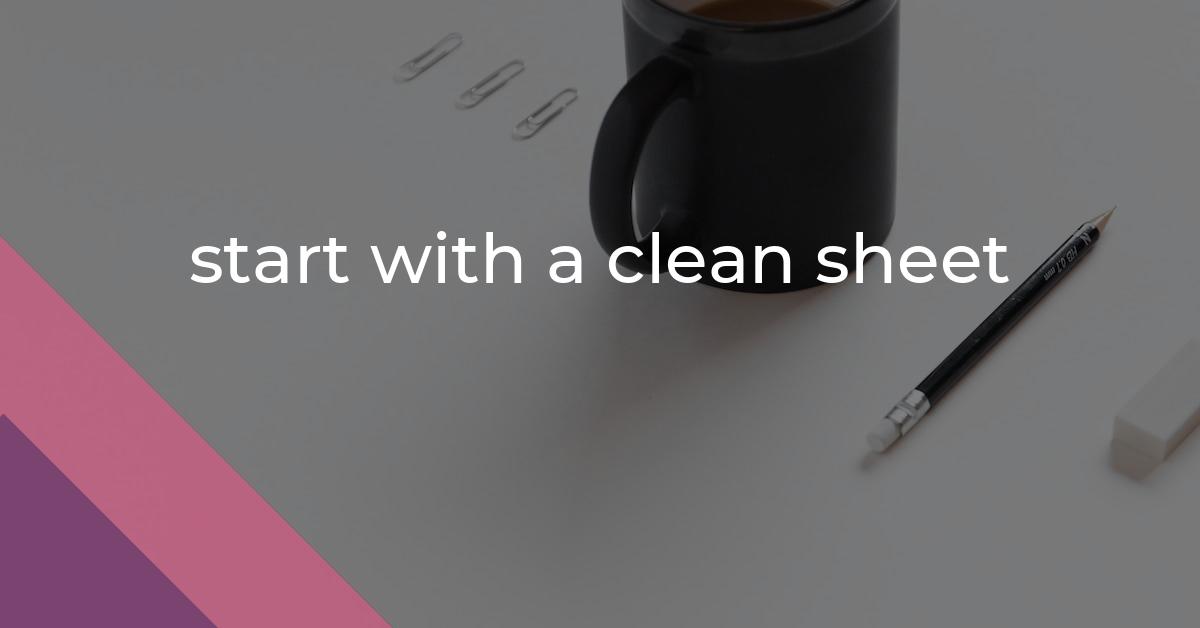start with a clean sheet: Idiom Meaning and Origin
What does ‘start with a clean sheet’ mean?
This idiom means to begin with a fresh start or a new approach, without any preconceived notions or biases from the past.

Idiom Explorer
An idiom that refers to the difficulties or setbacks experienced at the initial stages of a new project, process, or endeavor.
The idiom "take the plunge" means to take a significant and often risky step or action, especially when committing to something new or unknown.
The idiom "take the initiative" means to be proactive and make the first move or take action without being prompted or instructed.
The idiom "take one day at a time" means to focus on the present moment and not worry about the future or past. It emphasizes living in the present and taking things as they come, rather than getting overwhelmed by the big picture.
The idiom "take a gamble" means to take a risk or chance on something without being certain of the outcome.
The idiom "take a flyer" means to take a risk or gamble without considering the potential consequences or likelihood of success.
The idiom "sweep away" means to completely remove or eliminate something, often in a forceful or dramatic manner.
The idiom "sweep aside" means to dismiss or ignore something or someone as unimportant or insignificant, usually due to a lack of interest or consideration.
An idiom meaning to leave or depart, often used to describe ending a project or leaving a place quickly.
The idiom "straight out of the chute" means immediately or directly from the beginning, without any delay or hesitation.
Power of Blank Canvas
The idiom "start with a clean slate" is an expression commonly used in the English language to convey the idea of beginning anew, unburdened by past experiences or mistakes. The phrase combines the verb "start," meaning to initiate or begin, with the noun "slate," which refers to a smooth, flat surface used for writing or recording.
One possible origin of this idiom can be traced back to classrooms in the past, where students would write on small slates instead of using paper. At the beginning of a new lesson, the teacher would clean the slate, erasing all previous writings, to provide a fresh start for the students. This practice eventually gave rise to the figurative meaning of "starting with a clean slate" in a broader sense.
The idiom "start with a fresh start" is another expression with a similar meaning to "start with a clean slate." It emphasizes the concept of beginning anew, free from any past baggage or negative experiences. Just as one would start a new day with renewed energy and optimism, starting with a fresh start implies a clean break from the past and an opportunity to approach things in a different way.
Similarly, the idiom "start over" conveys the idea of starting again from the beginning, often as a result of wanting to improve previous efforts or outcomes. This phrase suggests a willingness to learn from past mistakes and a determination to make a fresh start, unencumbered by past failures.
On the other hand, the idiom "start a fresh hare" carries a slightly different connotation. While it still relates to starting anew, it also implies the pursuit of something new, exciting, or even risky. The phrase alludes to the imagery of starting a hunt for a fresh hare, symbolizing the pursuit of new opportunities or challenges.
The idiom "start with a clean slate" shares a common thread with these related expressions, as they all emphasize the significance of beginning anew and embracing fresh perspectives, opportunities, and adventures. Whether in personal or professional contexts, these idioms encapsulate the universal desire for growth, improvement, and positive change.
Recognizing the importance of starting with a clean slate, individuals and organizations can apply this concept in various aspects of their lives. In the world of business, for example, a company may choose to start with a clean slate when launching a new product or entering a new market. By doing so, they can approach the endeavor with an open mind and a willingness to adapt and innovate.
In personal relationships, starting with a clean slate can be essential for building trust and fostering healthy connections. When entering a new relationship, it is important to let go of any past baggage or negative assumptions and approach the person with a fresh perspective. By doing so, individuals can create a foundation for a positive and honest connection.
Similarly, in one's personal journey, starting with a clean slate can empower individuals to leave behind old patterns or habits that no longer serve them. Whether it's learning a new skill, adopting a healthier lifestyle, or pursuing a new passion, this approach allows individuals to embrace the possibilities of growth and transformation.
As with any idiomatic expressions, the true power of these phrases lies in their ability to evoke a universal understanding and convey complex ideas in a concise and relatable manner. By incorporating the idioms "start with a clean slate," "fresh start," "start over," and "start a fresh hare" into our conversations and writing, we can tap into their rich meanings and use them to inspire new beginnings and positive change.
The idiom "start with a clean sheet" is a versatile and powerful expression that embodies the concept of beginning anew and unburdened by past circumstances. Its origins can be traced back to different realms, such as sports and education, but its metaphorical usage extends far beyond its initial contexts. The related idioms "start with a clean slate," "fresh start," "start over," and "start a fresh hare" all share the common theme of initiating a new phase and embracing the potential that lies ahead. By incorporating these idiomatic expressions into our language, we can communicate our aspirations for growth, improvement, and a fresh perspective.
Example usage
Examples of how the idiom "start with a clean sheet" can be used in a sentence:
- After a tough day at work, I like to start with a clean sheet and leave all my worries behind.
- The new project manager decided to start with a clean sheet by implementing a fresh and innovative approach.
- As a student, it's important to start with a clean sheet each semester and set new goals for academic success.
More "Sports" idioms



